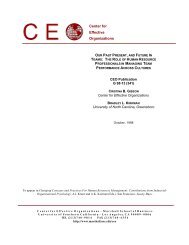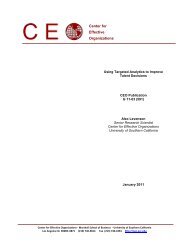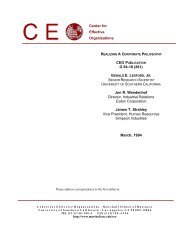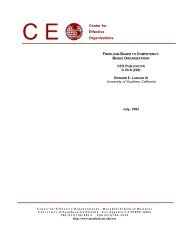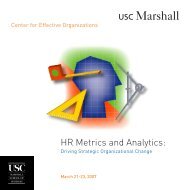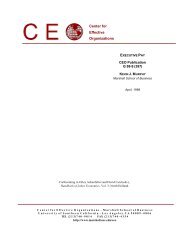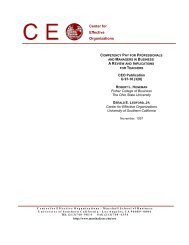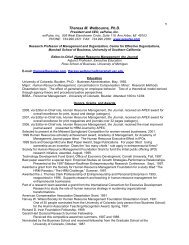Center for Effective Organizations - University of Southern California
Center for Effective Organizations - University of Southern California
Center for Effective Organizations - University of Southern California
You also want an ePaper? Increase the reach of your titles
YUMPU automatically turns print PDFs into web optimized ePapers that Google loves.
<strong>of</strong> the literature reveals virtually nothing in organization theory and research that address thevalue and function <strong>of</strong> not only these particular programs but the concept <strong>of</strong> “programs” ingeneral as potentially creative structural designs. Are companies as naïve as many scholarscontend? I doubt it. This interview makes clear that the programs at GE become a temporary anduseful structural innovation <strong>for</strong> organizing management resources and channeling themhorizontally and vertically across the corporation to solve immediate per<strong>for</strong>mance issues. GElaunches a sequence <strong>of</strong> programs over several years-- Workout, Best Practices and Six Sigma—that deal respectively with efficiency, knowledge and quality. Some <strong>of</strong> these programs areborrowed from outside and other aspects are tailormade. Even Crotonville houses programs onleadership where Welch and other senior managers become the teachers. Should academics giveprograms another look be<strong>for</strong>e prejudging their value?Knowledge management depends on social interaction, not computerized in<strong>for</strong>mation systemsMany consulting firms are now selling a brand <strong>of</strong> knowledge management as if it is a data setcontained in an in<strong>for</strong>mation system. These consultants mistakenly assume that knowledgemanagement consists <strong>of</strong> factual in<strong>for</strong>mation about who is doing what with whom, and that thesedata can be captured in a computerized system. Instead, we learn, to the contrary, from SteveKerr that knowledge management at GE is a social networking process that depends upon seniorleadership and employee involvement. Crotonville serves as GE’s center <strong>of</strong> knowledgemanagement where corporate strategies and practices are discussed, created and communicatednot only to employees but also to customers. The outcomes <strong>of</strong> Crotonville’s complexinfrastructure can hardly be reduced to bytes on an in<strong>for</strong>mation system. Instead, it is the firm’ssenior leadership, not outside gurus or corporate trainers or desktop icons that orchestrate thelearning process and the spread <strong>of</strong> knowledge at GE. We also see that Steve Kerr himselfbecomes the “in<strong>for</strong>mation system” as he acts as a 911 operator to facilitate the spread <strong>of</strong> “bestpractices” throughout GE. By using an intensely personal and in<strong>for</strong>mal process, GE leaderscontact Steve in person, on the phone, and by email, and he contacts them, to identifyknowledge, ideas and practices from inside and outside the corporation that might be useful tothem. These managers, in their quest <strong>for</strong> knowledge, are no doubt motivated to pay a lot moreattention to Steve because <strong>of</strong> who he is and who he is close to than if they were left on their ownto search through an expensive automated knowledge management system installed by aconsulting firm.Is academe out-<strong>of</strong>-touch with contemporary business practice?Toward the end <strong>of</strong> the interview, Steve unintentionally lets us know that academe may not bekeeping up with what is needed to train students <strong>for</strong> leadership positions in business. He doesnot argue that Crotonville should be a replacement <strong>for</strong> business schools—they serve differentpurposes. But he is reluctant to return to academe because it appears slow in its ability to act dueto a diffuse power structure. Perhaps we need this slowness and collegial sharing <strong>of</strong> power inuniversities to per<strong>for</strong>m contemplative research that is insulated from daily per<strong>for</strong>mancepressures. But then again, Steve can’t recall many theories that are <strong>of</strong> use to him in the realworld. For example, he chastens the strategy folks <strong>for</strong> not making their models more dynamicand adaptive. In these days when most young pr<strong>of</strong>essors rarely encounter real managers except



